
Read our 2023 annual report

Knowledge Hub
How Concern is improving hygiene and water access in Central African Republic
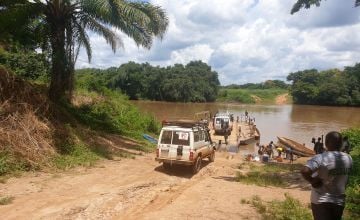
In Central African Republic, we are continuing our work to bring clean, safe water to communities who need it the most.
Did you know that more than half of Central African Republic's population of 4.9 million are in urgent need of access to water?
Concern, funded by Irish Aid, the US Bureau of Humanitarian Assistance and the John and Christine Bakalar Fund, are responding to these urgent needs in some of the country's most vulnerable areas.
We are also undertaking a development project supported by the European Union's Bêkou Fund, run in consortium with ACTED, COOPI, Oxfam, AGORA and Free Press Unlimited, which works towards local recovery by overcoming major security and logistical challenges in this landlocked area.
Concern's response in detail
According to the latest OCHA report, 2.8 million of CAR's 4.9 million inhabitants (57%) are in urgent need of access to water.
Central Africans suffer from a lack of clean water for consumption, from its overall quality and accessibility in terms of distance to water points, and its price.
These needs are greater for internally displaced people and in rural areas, where only 27% of the population has access to drinking water compared to 37% in the country's capital, Bangui.
As the saying goes: "Water is life." It is essential for universal domestic tasks such as cooking, cleaning, drinking and showering. Moreover, certain uses of water in CAR make access to it all the more crucial.
The staple food is cassava, a white root used in the preparation of all meals. However, when raw or poorly prepared, cassava contains the toxic element cyanide. To become edible, it must be dried in the sun and soaked in water for several days. Water shortages reduce the pre-cooking treatment of cassava and lead some families to ingest cyanide, resulting in irreversible damage such as partial paralysis.
The lack of access to clean water sources also leads to communities relying on unsafe water sources or stagnant pools of water. This encourages water-borne diseases such as diarrhoea, typhoid and hepatitis, which proliferate in this tropical area.
The construction and rehabilitation of water points coupled with specific awareness-raising on the transport and conservation of water and good hygiene practices are therefore essential to save and improve the lives of the population.
For example, as part of the RELSUDE project funded by the Bêkou Fund, Concern has been working in the town of Mobaye since the opening of a new base earlier this year.
In February 2022, the EHA team conducted a water needs assessment mission in the town: only 21% of the 30,000 inhabitants of Mobaye town have access to drinking water, with 79% using unprotected wells or remote sources. The town currently has only 17 functional water points.
The project will rehabilitate five boreholes and build five others, which will increase the total water coverage of Mobaye by more than 50%.
Carrying out projects in the face of high levels of poverty
Eastern CAR is one of the most volatile areas in the country. Clashes between armed groups and Central African and international forces are regular. These security crises have a strong impact on Concern's activities in the Ouaka and Basse-Kotto prefectures, where activities are frequently suspended due to insecurity.
The teams consistently demonstrate courage, resilience and professionalism in order to fulfil their mandate and help the most vulnerable.
In addition to the unpredictable security situation, which can affect the timetable, and in particular the appropriate period for the construction of new water points (during the dry season), the teams have to deal with significant logistical challenges.
It is difficult to find good quality materials and supplying the remote base of Kouango can take a long time. Some parts are not available locally (such as hand pumps for drilling or reagents for chemical and bacteriological water testing) and must be imported from abroad. Road transport between Bangui and the Ouaka prefecture is difficult between May and November, during the rainy season when roads are impassable.
The alternative of whaleboats to transport materials by river does not work during the dry season as the water level is too low to allow them to pass. Numerous unforeseen circumstances and structural constraints can thus thwart the planning of activities.
Finally, high levels of poverty and lack of access to liquidity make it difficult to access credit and to create local community funds such as those for the maintenance of water points, which are often at the risk of breakdown.
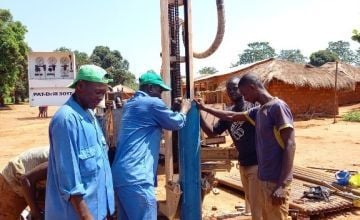
Combining WASH activities and a behaviour change approach
Despite these major structural challenges, Concern, following its mandate to reach the most vulnerable, is working in this remote and unstable area to provide better access to water, sanitation and hygiene (WASH) for the poorest populations, with a mix of construction and the raising of awareness.
We will complete 34 new boreholes across CAR in 2022, five of which have already been dug.
Thirty of these, planned for Ouaka and Basse-Kotto, are being drilled using the PAT-drill, funded by private donors John and Christine Bakalar, which can dig deeper (up to 100 metres) and faster (only a few days instead of weeks) than a hand drill.
Twenty nine existing but non-functioning water points or springs will also be rehabilitated.
In total, approximately 32,000 people will have access to clean water in the area thanks to Concern and its project funders.
Since 2015, Concern has built and/or rehabilitated around 150 water points, ensuring the quality of the water through chemical and bacteriological tests. In parallel, Concern also builds family latrines (210 in the RELSUDE project for example) and community latrines as well as waste pits in health centres.
In addition to this increased access to EHA facilities, Concern carries out awareness-raising activities, which act on the knowledge, behaviour and attitudes of the population to reinforce good hygiene practices.
In the framework of several projects, including the one financed by the Bêkou Fund, Concern trains Community Relais (RECOs), chosen by their peers, and provides them with picture boxes, illustrating daily situations to be able to discuss door-to-door with families whose members are frequently illiterate.
The awareness-raising sessions focus on hand-washing with soap, the water contamination chain, barrier actions against COVID-19 and the dangers of waterborne diseases.
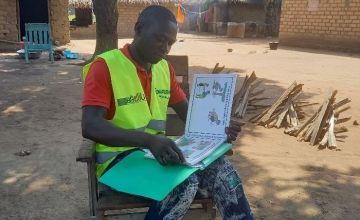
Among the recommendations they provide, the RECOs encourage people to wash their hands before going to the borehole so as not to contaminate water, to use lids to cover the water and prevent possible contaminations, to filter the water before drinking it, to put the water on a high place to prevent children from dipping their fingers in it, and to boil it to kill germs.
Marie Huguette Dabe, RECO for the RELSUDE project, says: "People listen and apply my recommendations, and they thank me."
Another RECO from the project, Edmond Narcisse Ndjhoba, says: "When people started adopting the practices I was recommending, it was a good feeling, I felt that they were very happy with my work. There is a lot of gratitude, not only to me but also to Concern for making it possible to have community relays."
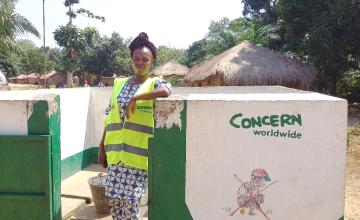
Working with communities for greater ownership and sustainability
Concern prioritises a participatory and community-based approach in all its projects.
This ensures that beneficiary communities are included at all stages of implementation, and that they are accepted and empowered at the end of the project. For example, Concern encourages the participation of families in the construction activities from which they will benefit.
They collect locally available materials, such as sand, gravel or sheet metal, which will be used to build the slabs and superstructure of their personal latrines. This involvement allows them to be actors in the work and to encourage a transfer of skills for a more sustainable action.
In addition, Concern promotes the sustainability of its action by training maintenance officers for each waterpoint, who can detect malfunctions and repair small defects (cracks, broken pedals), and repairmen who intervene on more technical repairs.
To facilitate the work of the maintainers and repairers, Concern plans to identify places that sell spare parts in the area and refer them to the waterpoint management committees, with a list of average prices.
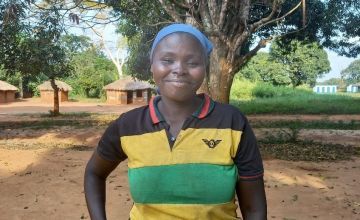
Concern also sets up water point management committees or community assistance committees, whose members are elected from the community.
Concern promotes gender parity in membership and encourages women to apply for positions of responsibility on the committee (chairperson, secretary, treasurer, hygienist and maintainer). Milène Rowana is a hygienist and a member of the management committee of the water point in Gouasse, for the project funded by Irish Aid. She meets with the families who use the water point to encourage them not to wash or leave dirty plates, cans, or dirty laundry near the borehole.
Finally, this sensitivity to people and context is essential in behaviour change activities such as those on harmful gender biases and beliefs. The work of community mobilisers, such as RELSUDE's RECOs, also contributes to addressing gender stereotypes and inequalities.
It is mainly women and children who draw water and whose daily lives will be made easier by the provision of boreholes near their homes. Many husbands feel that their wives are responsible for domestic tasks, including the provision of water.
Milène Rowana laughs: "If you see a man fetching water, it means he is single." She observes that this gendered belief starts at a very young age, as even little boys do not want to fetch water next to girls. So part of her mission is to make men aware of their responsibilities in collecting and managing water.


